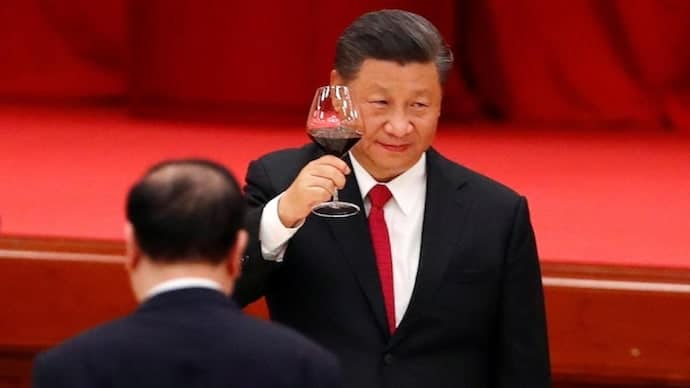A crucial party spokesperson stated that Beijing has reserved its right to use force against Taiwan under compelling conditions. This is before the anticipated installation of Xi Jinping as the Communist Party of China’s general secretary for the third time.

(Image: Reuters/FILE)
China’s crucial party decision
Using force against Taiwan is Beijing’s last alternative, according to a Communist Party of China (CPC) spokesperson, and it will only do so in extreme circumstances.
Before the 20th National Congress of the CPC, which will transpire from October 16 to 22, the announcement was made during a press conference. 2,296 “elected” delegates who were chosen by their leader to attend the closed-door conclave are anticipated to vote in favour of President Xi Jinping’s candidacy for a third five-year term.
Sun Yeli, a spokesperson for the crucial party of China CPC, stated on Saturday that “peaceful reunification is its (China’s) first choice.”
According to Yeli, the goals and interests of “everyone,” including Taiwan’s citizens, were served by the reunification of China and Taiwan.
Read More: https://tdznkwjt9mxt6p1p8657.cleaver.live/china-all-set-to-reveal-new-leadership/

Sun Yeli was quoted by Chinese official broadcaster CGTN as saying, “In not committing to renounce the use of force, we are in no way targeting our Taiwan compatriots, but rather foreign intervention and an exceedingly small number of “Taiwan independence” elements and their separatist operations.”
He emphasised China’s willingness to keep working towards peaceful reunification with Taiwan.
It’s interesting to note, that Yeli claimed there were more parallels than differences between Beijing and Washington in terms of their relations. He recommended that the US and China figure out a way to get along in the near future. He also emphasised the need of “coexistence and win-win collaboration” as building blocks of strong bilateral ties.
This is in light of the relations between the US and Taiwan, where it is widely believed that the White House is a steadfast ally of Taiwan’s sovereignty. US ammunition has also been a significant Taiwanese supplier.
Taiwan’s defence minister Chiu Kuo-cheng had earlier in the first week of October made it plain that the island will take measures in response to Chinese warplanes and drones entering its airspace, but he did not provide any specifics on what those steps would be.
According to Chiu Kuo-cheng, China’s new aggressive posture has altered what Taiwan would consider to be a “first strike” that would require retaliation.
China had increased its military drills, shot missiles into waters close to Taiwan, and flew jets beyond the demarcation line in the Taiwan Strait in reaction to a visit by US House Speaker Nancy Pelosi, in August.
On the other hand, on October 13, the Taiwanese defence ministry granted Taiwan troops stationed at the frontline complete freedom to conduct “first strike” operations using PLA planes, drones, and other means.
China-taiwan Dispute
Following the two countries’ separation in 1949, as a result of a civil revolt and a war, China now claims Taiwan, which is located to the east of China’s coast. While competitors built their governments in Taiwan, the crucial party CPC maintained control of mainland China.

Ann Wang / Reuters
Strategists on both sides, appear to have forgotten what American game theorist Thomas Schelling taught years ago: deterring an adversary from taking a proscribed action requires a combination of credible threats and credible assurances.
Tensions between Beijing and Washington over Taiwan are rising, and this has strategists on both sides concerned. Instead of learning from that experience, an increasing number of American analysts and officials have urged the country to treat Taiwan as though it were a separate state.
Also, to abandon its long-standing policy of “strategic ambiguity” in favour of “strategic clarity,” which is defined as an unwavering commitment to use military force to defend the island in the event of an attack from the mainland Chinese.Since Russia’s invasion of Ukraine, these requests have grown louder, with some commentators even calling for Taiwan to be formally recognised as a sovereign state.
Others have advocated for the permanent (and substantial) deployment of American forces in Taiwan in order to support the American threat of a military response to an attack on the mainland.
Ely Ratner, the assistant secretary of defence for Indo-Pacific security affairs, suggested in evidence before the U.S. Senate last year that the United States could never permit Beijing to govern Taiwan because such a situation would make it impossible to defend other U.S. allies in Asia.
However, changing U.S. policy to advocate for Taiwan’s complete secession from the mainland is more likely to incite an assault on Taiwan than to prevent one.
Credibility is necessary for deterrence in all of its components, threat and assurance. Both the costs of a prohibited conduct and the political will to impose those costs must be signalled in order to constitute a threat.
The target must be assured that refraining from the forbidden activity will not result in its exploitation, and this guarantee must be communicated in a fashion that the target can trust.In order to prevent conflict in the Taiwan Strait, all parties must be dissuaded.
Taiwan must be prevented from formally declaring its independence, Washington must be prevented from doing so or from re-establishing a formal alliance with the island, and Beijing must be prevented from employing military action to impose unification of Taiwan.
All crucial party must be given the assurance that they won’t suffer grave damages to their interests, if they refrain from taking certain activities, in addition to being threatened with punishment for crossing these redlines.
For more than 40 years, triangular deterrence has been effective in keeping the Taiwan Strait peaceful. However, escalating tensions have made this precarious arrangement even more so.













